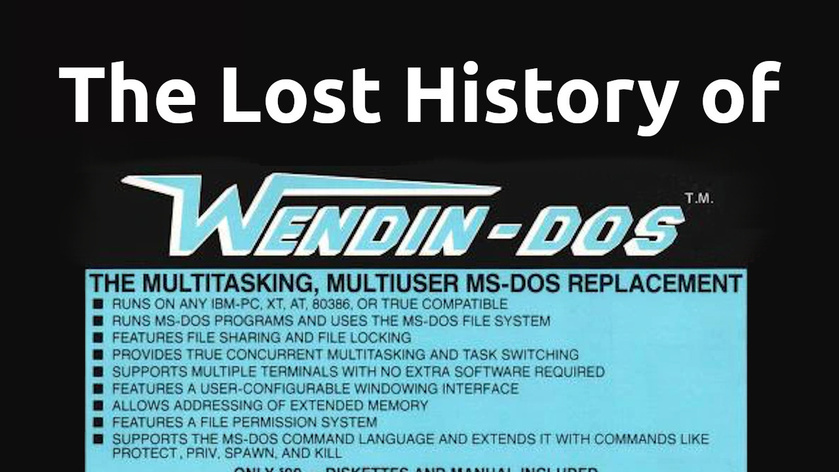Back in 1987, an MS-DOS compatible operating system debuted that — despite a truly impressive and fascinating feature set — has been all but lost to history: Wendin-DOS.
This wasn’t some simple DOS clone, either. Wendin-DOS was a multitasking, multi-user DOS with the ability to run individual applications in movable windows.
Yet, sadly, there is almost no information available on the history and development of this fascinating system.
Let’s remedy that.
I managed to track down the developer of Wendin-DOS, Steve Jones, to find out as much as I could about the history of the system.
The Wendin-DOS story begins, as so many stories do, with a young nerd… playing with computers in High School…
Steve Jones: “The moment I saw an ASR33 teletype, I knew what I wanted to do. In high school, I spent more time programming a Univac 70/7 (IBM 360 clone) than anything else. Studied the operating system, wrote a disassembler to reveal how it worked, and wrote a bunch of system-oriented software for it.
In college I got a job with the academic computer center and studied its operating system, as well as the up-and-coming VAX/VMS. I started learning about what Dave Cutler was doing and wished I could work with him.”
For those unaware: Dave Cutler is an absolute legend in the operating system world, having been one of the engineers responsible for VMS, and would later go on to lead the NT project at Microsoft.
Now that Steve was out of school, things started to get really interesting…
“After college, I started a software company in Spokane that operated in the same building as my parents' company, Jones Double-Reed Products. My brother Greg joined me, and together we cloned VAX/VMS (well, as well as we were able), added a PC API module (we called it "the Filter", which included INT 20h-2fh redirection and processing, as well as some other PC interrupts to achieve rerouting of BIOS calls.) We hired Scott, a local software engineer, to help us, and put him on the filter-- toughest job, since it was basically a compatibility layer for all the DOS stuff out there. I can't tell you how many times Word Perfect and Lotus 1-2-3 were causing him fits. Then we split it up, Greg took the VMS shell and utilities, and I took the kernel-- which was really just VAX/VMS, with 4 stacks per process, ASTs, QIO, RMS, the whole thing.”
Three engineers, in Spokane Washington, who built a VMS clone for x86 PCs.
Already quite cool… and then this little rag-tag team decided to do something even cooler… they built an “Operating System Toolbox”.
“We got the idea to just replace the shell and utilities to make other operating systems-- PCUNIX (later renamed to PCNX when AT&T sent us a letter), and finally, stripped them off to create Operating System Toolbox, which was just the source, in a toolkit that people could use to create their own shell and utilities around the kernel. We ended up selling about 400 copies of each of these things a month as I recall, in response to ads in Dr Dobbs, BYTE, Embedded Systems Programming and a few others.
An open source (before people really used the term regularly) kit for building a multitasking operating system. Plus a VMS clone and UNIX clone for IBM compatible PCs.
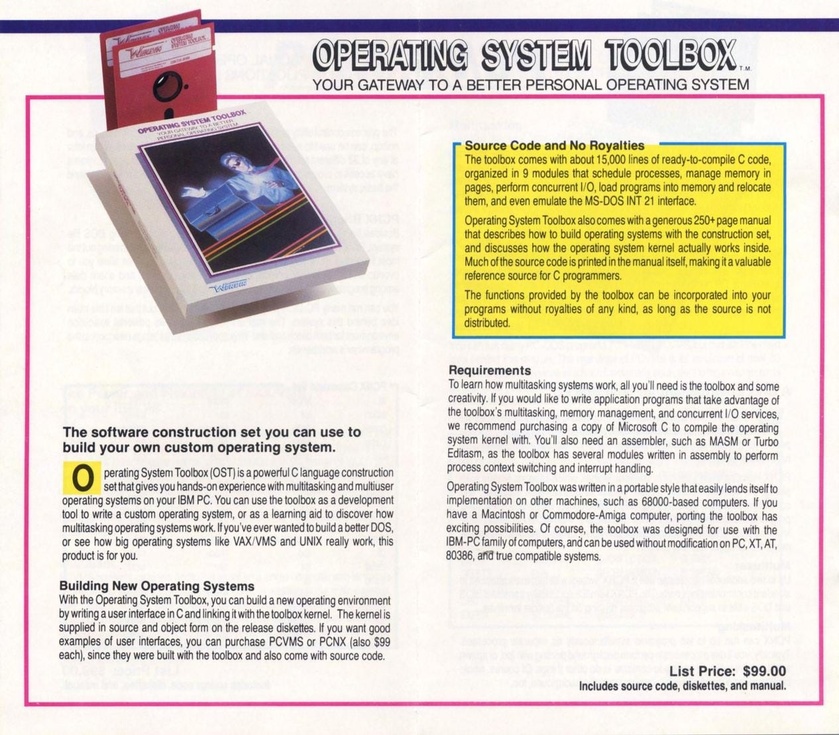
Think about that for a moment. It’s 1986. And there’s a UNIX clone, for IBM PCs, that (via the Operating System Toolbox) has some of the source code available for it. This was a full half decade before Linus Torvalds would start the Linux kernel project.
This is some mightily impressive stuff here.
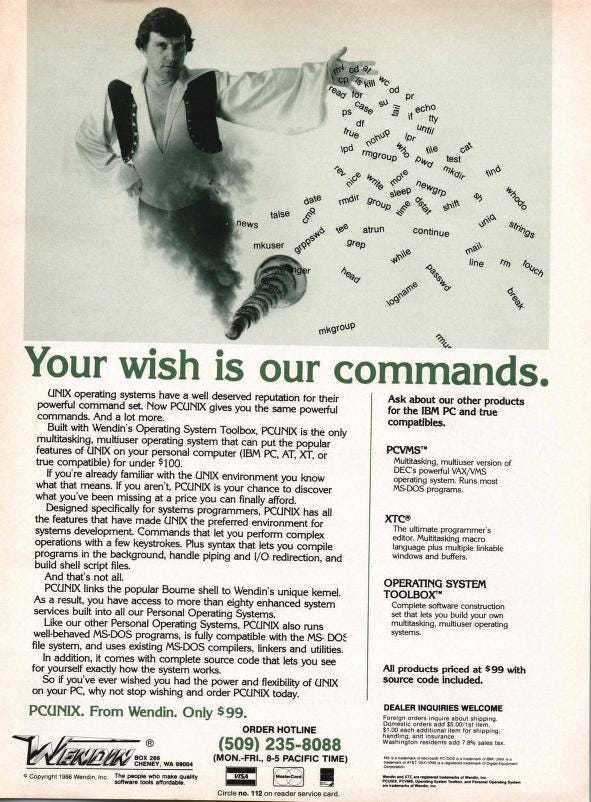
This tiny little company now had two complete operating systems (plus the Operating System Toolbox). Which is where DOS enters the story…
“With so many people wanting an alternative to MS-DOS (one that was bootable from a disk, not runnable as a program from DOS)-- we did another round of development and created Wendin-DOS, 'the DOS of the future.'
We were able to demonstrate running real DOS apps in overlapping, character-oriented windows, as well as screen groups, ala the up-and-coming Microsoft OS/2.”
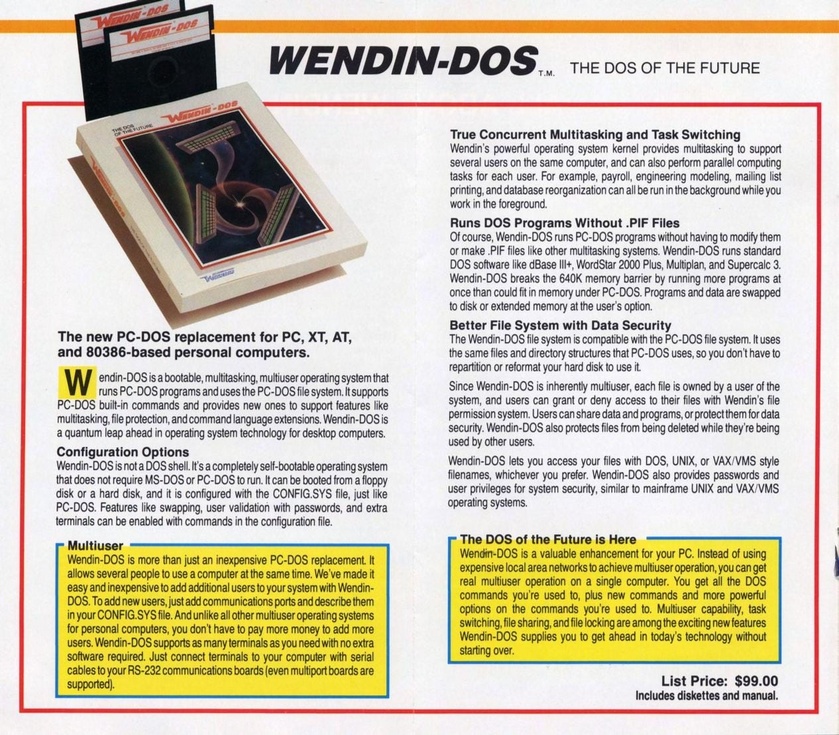
Wendin-DOS certainly seemed to generate a good amount of interest from the press back in 1987.
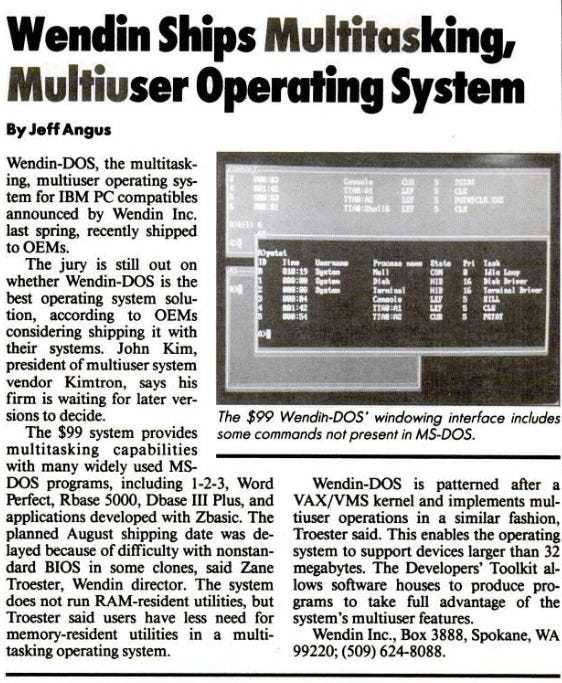
Of course, being a small company and supporting three different operating systems has some significant challenges. Namely: testing the system with a wide variety of software. The Wendin crew did a little outside the box thinking on that…
“Once we had the basic software going, we realized if we were going to compete with Microsoft, we would need testers. Since we didn't have the money for our own, we created a debugging contest, and each person got an "I Debugged The DOS Of The Future" mug, plus a large prize for the winners. The bug reports flooded in, but the winner was astounding-- he submitted a ream (500 pg) of paper, with each page containing a bug report describing the nature of the problem, how to reproduce it, a diagnosis of the problem and suggested fix; this thing was just off the charts great. Turned out, he was institutionalized in some way and couldn't really go get a job, so he had time on his hands.”
According to the July 1987 issue of “80 Micro” (a Tandy oriented magazine) the Wendin crew even traveled to the famous West Coast Computer Faire to demonstrate Wendin-DOS.
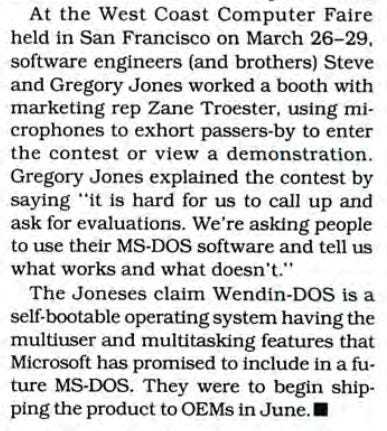
Updates to Wendin-DOS were worked on for a while after the first release shipped…
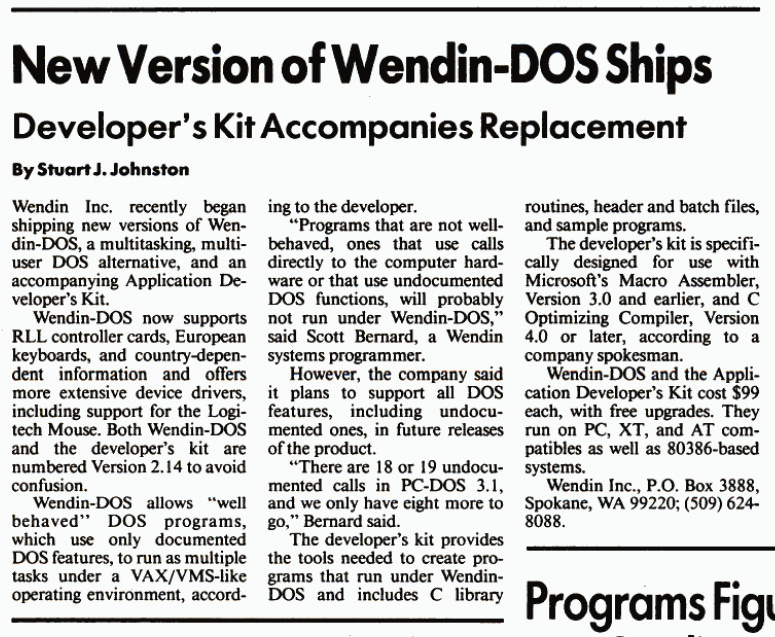
But, not long after Wendin-DOS hit the market, Steve Jones (and his brother) left the company and headed off to work at Microsoft. At which point Wendin-DOS (along with the Operating System Toolbox, PC/VMS, and PCUNIX) all quickly faded into obscurity.
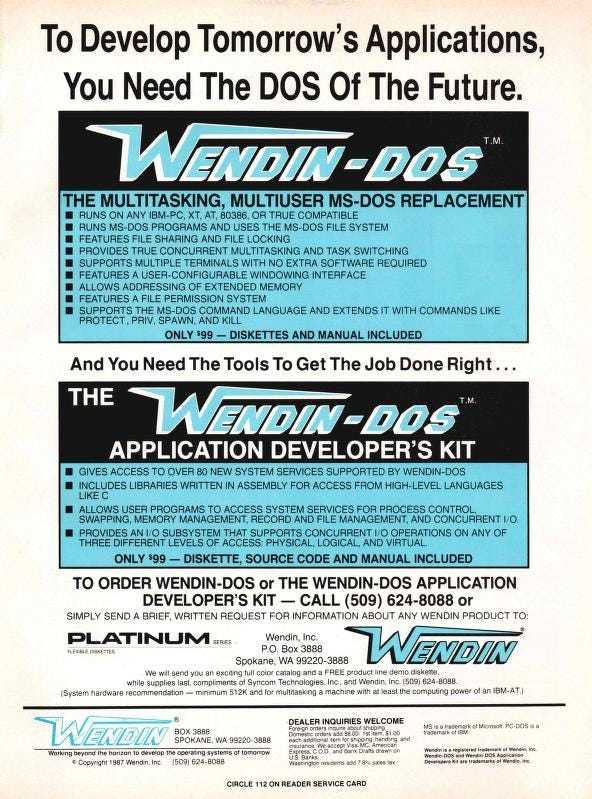
What could Wendin-DOS (along with PC/VMS and PCUNIX) have become had they had a few more years to mature with the original team? We’ll never know… but, considering the amazing accomplishments from that small team (in such a short period of time)… my guess? It would have knocked our socks off.
Epilogue
Steve Jones would go on to eventually become the CTO for BIOS maker Phoenix Technologies. Along the way — immediately after stopping work on Wendin-DOS — he spent some time over at Microsoft working working for the very engineer that inspired him back in High School.
“I got to work for Dave Cutler and really feel like I apprenticed with him-- it was a fantastic experience, working for the MAN.”
And Dave Cutler wasn’t the only computer pioneer that Steve ended up rubbing shoulders with…
Funny little story-- as I roamed the Microsoft hallways in building 2 on my first day, I ran into Larry Osterman's office with his bulletin board outside. On that bulletin board was posted our Wendin "love letter", which was something we sent out because we were delaying shipment of Wendin-DOS while we were processing all those bugs. On the form letter, Larry had written, "Guess writing a DOS is harder than you thought!" Not surprising, since Larry wrote DOS 4, the multitasking version of MS-DOS that never really went anywhere but was pretty ambitious at the time. We were largely solving the same problems, though he had full MS-DOS 3.31 source code (a great version of DOS) and we had our debugger to work with. Larry and I had a good laugh about it. Tim Paterson, the original 86-DOS implementer, had an office across the hall.”
Editors note: I had the good pleasure of interacting with Tim Paterson back in the 1990s, when we both worked at Microsoft. I was a young nerd, he was the software legend responsible for building the original “Quick and Dirty Operating System” that would go on to become “MS-DOS”. He was incredibly kind and gracious.
Many thanks to Steve for writing up some of this history and sharing his thoughts. It is so important that this amazing — and fascinating — part of computer history be properly documented. While there is still much to record about the work of this team, this is a good start.
Nowadays, Steve Jones runs NeuroSynthetica in Seattle, WA.
Can I run Wendin-DOS in 2022?
You can, indeed, run Wendin-DOS in emulation on modern machines. I was able to boot version 2.11 inside VirtualBox:
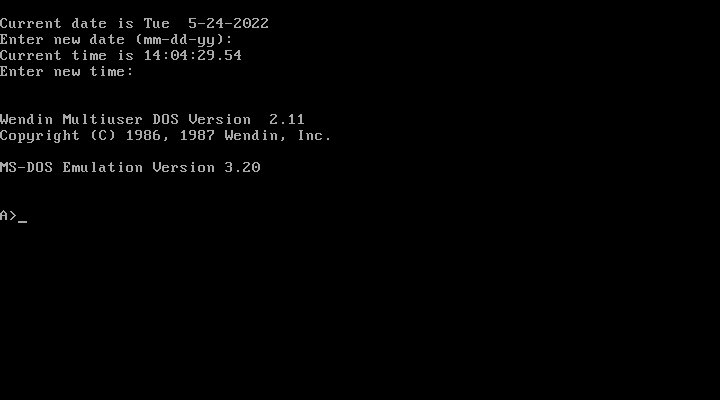
Note: Wendin DOS 2.11 can be found in a few corners of the Internet. Due to uncertain legal status of the software, I can't link to it directly.
